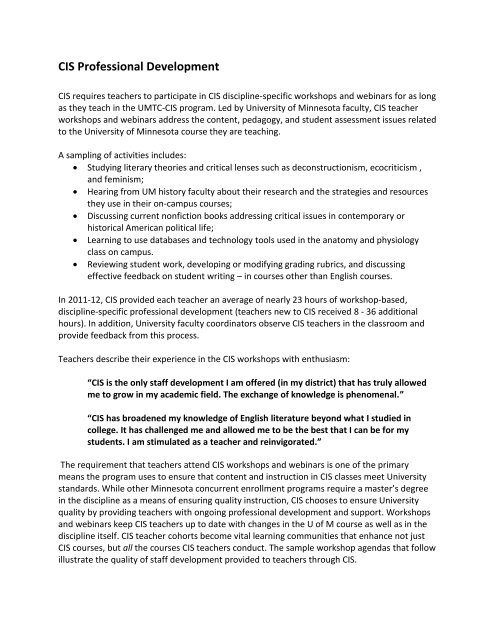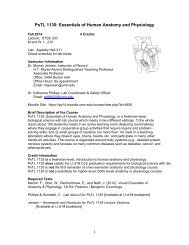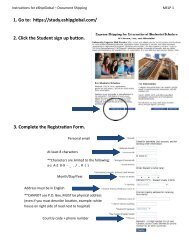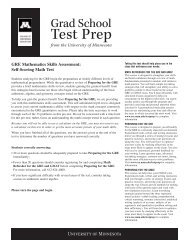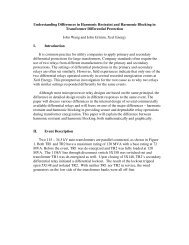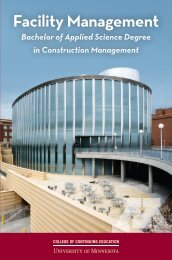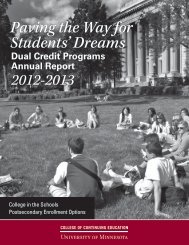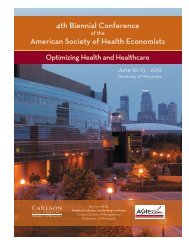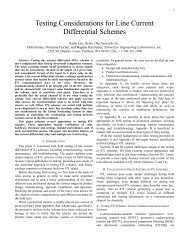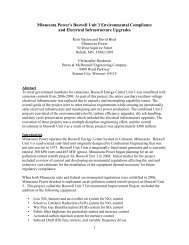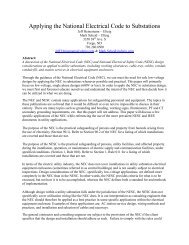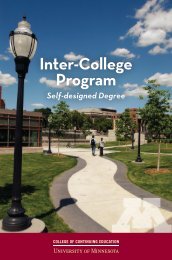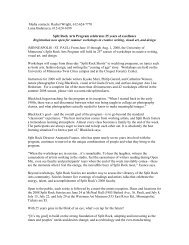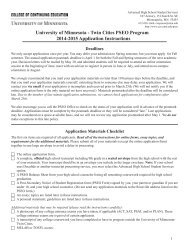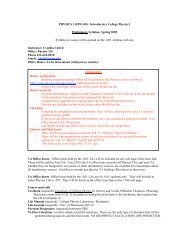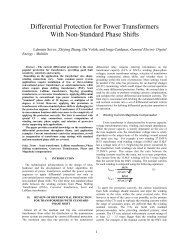CIS Professional Development - University of Minnesota
CIS Professional Development - University of Minnesota
CIS Professional Development - University of Minnesota
You also want an ePaper? Increase the reach of your titles
YUMPU automatically turns print PDFs into web optimized ePapers that Google loves.
<strong>CIS</strong> <strong>Pr<strong>of</strong>essional</strong> <strong>Development</strong><br />
<strong>CIS</strong> requires teachers to participate in <strong>CIS</strong> discipline‐specific workshops and webinars for as long<br />
as they teach in the UMTC‐<strong>CIS</strong> program. Led by <strong>University</strong> <strong>of</strong> <strong>Minnesota</strong> faculty, <strong>CIS</strong> teacher<br />
workshops and webinars address the content, pedagogy, and student assessment issues related<br />
to the <strong>University</strong> <strong>of</strong> <strong>Minnesota</strong> course they are teaching.<br />
A sampling <strong>of</strong> activities includes:<br />
Studying literary theories and critical lenses such as deconstructionism, ecocriticism ,<br />
and feminism;<br />
Hearing from UM history faculty about their research and the strategies and resources<br />
they use in their on‐campus courses;<br />
Discussing current nonfiction books addressing critical issues in contemporary or<br />
historical American political life;<br />
Learning to use databases and technology tools used in the anatomy and physiology<br />
class on campus.<br />
Reviewing student work, developing or modifying grading rubrics, and discussing<br />
effective feedback on student writing – in courses other than English courses.<br />
In 2011-12, <strong>CIS</strong> provided each teacher an average <strong>of</strong> nearly 23 hours <strong>of</strong> workshop‐based,<br />
discipline-specific pr<strong>of</strong>essional development (teachers new to <strong>CIS</strong> received 8 - 36 additional<br />
hours). In addition, <strong>University</strong> faculty coordinators observe <strong>CIS</strong> teachers in the classroom and<br />
provide feedback from this process.<br />
Teachers describe their experience in the <strong>CIS</strong> workshops with enthusiasm:<br />
“<strong>CIS</strong> is the only staff development I am <strong>of</strong>fered (in my district) that has truly allowed<br />
me to grow in my academic field. The exchange <strong>of</strong> knowledge is phenomenal.”<br />
“<strong>CIS</strong> has broadened my knowledge <strong>of</strong> English literature beyond what I studied in<br />
college. It has challenged me and allowed me to be the best that I can be for my<br />
students. I am stimulated as a teacher and reinvigorated.”<br />
The requirement that teachers attend <strong>CIS</strong> workshops and webinars is one <strong>of</strong> the primary<br />
means the program uses to ensure that content and instruction in <strong>CIS</strong> classes meet <strong>University</strong><br />
standards. While other <strong>Minnesota</strong> concurrent enrollment programs require a master’s degree<br />
in the discipline as a means <strong>of</strong> ensuring quality instruction, <strong>CIS</strong> chooses to ensure <strong>University</strong><br />
quality by providing teachers with ongoing pr<strong>of</strong>essional development and support. Workshops<br />
and webinars keep <strong>CIS</strong> teachers up to date with changes in the U <strong>of</strong> M course as well as in the<br />
discipline itself. <strong>CIS</strong> teacher cohorts become vital learning communities that enhance not just<br />
<strong>CIS</strong> courses, but all the courses <strong>CIS</strong> teachers conduct. The sample workshop agendas that follow<br />
illustrate the quality <strong>of</strong> staff development provided to teachers through <strong>CIS</strong>.
Updated 1/2012<br />
<strong>CIS</strong> WRITING STUDIO NEW TEACHER WORKSHOP JUNE 21, 2011<br />
Understanding the Context for the <strong>CIS</strong> Writing Studio Course<br />
What is College in the Schools?<br />
o <strong>CIS</strong> video<br />
How is WRIT 1201: Writing Studio different from WRIT 1301: <strong>University</strong> Writing<br />
o 1201 vs. 1301<br />
What is the Department <strong>of</strong> Postsecondary Teaching and Learning?<br />
o mission statement<br />
What is the Entry Point Project and how are its courses different from other <strong>CIS</strong><br />
courses?<br />
o Universal Instructional Design<br />
How is <strong>CIS</strong> Writing Studio designed to fulfill Entry Point Project goals?<br />
Interactive pedagogy<br />
o Sample discussion prompts and small-group assignments<br />
o Survey comments on working with classmates, breaking down barriers<br />
Practice coupled with feedback<br />
o Peer review protocols<br />
o Teacher feedback protocols<br />
o Survey comments on importance <strong>of</strong> feedback from teacher<br />
Critical reflection on learning<br />
o Sharon Ornelas’ action research project: building students’ ability to self-assess<br />
o Irondale photos<br />
o Survey comments on understanding what it means to be a college student<br />
Encouraging “writing that matters”<br />
What matters to us? What would we change if we could? (Lee and Gallagher 62)<br />
What matters to students?<br />
Following one strand in Barbara’s Fall 2006 class:<br />
Writing about harassment and name-calling, using articles from Rethinking Schools<br />
o Pre-reading discussions that prompt writing used in essays<br />
o Post-reading exercises that prompt writing used in essays<br />
o The skeleton <strong>of</strong> Sysouda’s Paper 3: Planning, elaborating, discovering an<br />
argument<br />
o Sysouda’s skeleton compared with Maivue’s: Could Maivue have discovered an<br />
argument?<br />
o Transitioning from Paper 3 to Paper 4: How are earlier topics recycled?<br />
o Who really benefits from the Writing Studio course? How would you assess<br />
Sysouda’s need for the course? Maivue’s need for the course? What issues do you<br />
struggle with in selecting students?
<strong>CIS</strong> Anatomy and Physiology Summer 2011 Teacher Workshop<br />
New and Returning Teachers<br />
Monday July 25<br />
8:30 C<strong>of</strong>fee and polite happy conversation<br />
9:00 Introduction <strong>of</strong> new folks -- and introductions <strong>of</strong> everyone<br />
9:45 Coop quiz -- yes, you're still expected to do one coop quiz per week next year<br />
10:30 POGIL introduction -- process skills -- big overview <strong>of</strong> the project<br />
Develop one "model" for an introduction to homeostasis. 5 or 6 groups will<br />
independently develop an activity, and we'll have a Darwinian like competition to<br />
see what happens ...<br />
1:00 David Parkin and Ron Gerrits -- guest speakers ...<br />
2:30 Coop Quiz #3 <strong>of</strong> the day ..<br />
3:00 Judging "homeostasis" activity -- who has the best activity?<br />
POGIL Workshop for Human Anatomy and Physiology<br />
Tuesday July 26<br />
8:30 Introduction to POGIL Pedagogy - lead by Patrick<br />
12:00 Lunch (NSF Group meets to discuss long term planning)<br />
1:00 Writing Intro / Session I - 100 minutes estimate (Murray or Patrick Leads)<br />
3:00 Break and Curriculum Group Brainstorming (Large Post It Notes)<br />
4:00 Report Out – What concepts make for a good POGIL activity<br />
4:30 Adjourn<br />
Wednesday July 27<br />
8:30 Writing Session 2 - Intermediate Writing (Lead by Murray or Patrick)<br />
10:00 Writing teams begin developing learning goals.<br />
11:00 Speed “dating” – 2 People at poster / 2 people “roam”<br />
12:00 Lunch - (NSF Group meets to discuss accounting - evaluation)<br />
1:00 Writing groups work on learning objects<br />
4:00 or 4:30 First draft <strong>of</strong> activity due (Copies made for start <strong>of</strong> next day)<br />
Thursday July 28<br />
8:30 Writing Activity #3 / Advanced Writing (focuses on feedback)<br />
10:15 Feedback rubrics<br />
11:00 Using rubrics, review other group’s activities<br />
12:00 Lunch (NSF group meets to discuss evaluation)<br />
1:00 Revise activities<br />
2:30 Share / present activities<br />
4:00 Submit files – Wrap Up<br />
Friday July 29<br />
8:30 C<strong>of</strong>fee and happy polite conversation<br />
9:00 Debrief -- POGIL workshop<br />
9:30 Review POGIL activities .. review feedback forms -- process for providing feedback<br />
12:00 Go to Appleby Hall. Use computers in biology lab; work on Moodle documents;<br />
update our files<br />
Afternoon on Friday -- individual meetings with Murray and Allison
<strong>CIS</strong> Animal Science, AnSc 1101<br />
New <strong>CIS</strong> Teachers Summer Workshop<br />
Tuesday and Wednesday; June 14 and 15, 2009, 9 a.m. to 4 p.m.<br />
Agenda<br />
Welcome and introductions<br />
Syllabus for AnSc 1101 Course outline<br />
Fulfilling the laboratory requirements <strong>of</strong> the course<br />
Materials needed.<br />
<strong>CIS</strong> announcements – Julie Williams<br />
Use <strong>of</strong> WebCT<br />
Methods <strong>of</strong> class presentation.<br />
Go over lecture materials<br />
Tour <strong>of</strong> St. Paul Campus – AnSc facilities.<br />
Discuss AnSc major at the “U” – trends, future, careers<br />
New and Veteran Teachers Summer Workshop<br />
Monday and Tuesday – June 20 and 21, 2011<br />
Monday 9 a.m. to 4 p.m.<br />
Welcome and Introductions<br />
Announcements relative to <strong>CIS</strong> – Julie Williams, College in the Schools<br />
Teaching schedule for next year – student registration and WebCT access<br />
Discussion <strong>of</strong> grades and common final exam questions<br />
Sharing <strong>of</strong> materials developed, things that worked and did not work –<br />
lectures, labs<br />
Plans for field trips to campus next year<br />
Update lecture material developed in the past year – companion animal and<br />
reproduction<br />
Set dates for Student Campus Workshops, Webinars, and Summer 2012<br />
workshops.<br />
Tuesday 7:30 a.m. to 4 p.m.:<br />
We will be leaving in a van from Haecker Hall on a field trip to Animal<br />
Enterprises.<br />
Miscellaneous:<br />
Dress is casual.<br />
C<strong>of</strong>fee and snacks will be available at 9 a.m. for the campus sessions.<br />
Lunch will be on your own (45 minutes). You can eat at the student center,<br />
across the street or bring your own.
HISTORY <strong>CIS</strong> SUMMER AGENDA<br />
Monday June 20, 2011<br />
8:30 am-8:40 am: Welcome and Announcements<br />
8:40 am-9:25 am: 1307/1308 Course Objectives & Skills Sets<br />
9:30 am-11:30 am: Kate Peterson, Library Resources Workshop<br />
Wilson S30-C<br />
11:30 am-12:15 pm: Lunch<br />
12:15 pm-2:20 pm: Discussion: Common Assignment<br />
2:30 pm-4:00 pm: Guest Speaker: Kirsten Fischer, Associate Pr<strong>of</strong>essor <strong>University</strong> <strong>of</strong><br />
<strong>Minnesota</strong> History Department<br />
“Religion and the Founders”<br />
Tuesday June 21, 2011<br />
8:30 am-9:45 am: Workshop Session, Wilson S30-C<br />
10:00 am-11:30 am: Guest Speaker: Evan Roberts, Assistant Pr<strong>of</strong>essor<br />
<strong>University</strong> <strong>of</strong> <strong>Minnesota</strong> History Department<br />
“Sex, Love, Contraception and Population in 20 th Century U.S.”<br />
11:30 am-12:15 pm: Lunch<br />
12:15 pm-2:00 pm: Student Assessment<br />
2:10 pm-3:15 pm: Discussion: Syllabi<br />
3:15 pm-3:45 pm: Wrap-Up Discussion: Common Assignments<br />
3:45 pm-4:00 pm: Closing Remarks
COLLEGE IN THE SCHOOLS SPANISH<br />
NEW <strong>CIS</strong> INSTRUCTORS<br />
Friday August 19, 2011<br />
9:15 Introductions: (background, why transition to <strong>CIS</strong>? Distribute new instructor packet.)<br />
9:30 Introduction to Spanish 1003-04 Program at the U <strong>of</strong> MN (Text and all its components,<br />
special features <strong>of</strong> Conexiones, online features, cds etc)<br />
10:00 Break<br />
10:15 View online activities for Conexiones http://www.pearsonhighered.com/conexiones/<br />
View Online Workbook My Spanish Lab http://www.myspanishlab.com/<br />
View the online archive MOODLE<br />
11:00 What does the 1003 /1004 Program look like at the U<br />
(Syllabi and Orientation Packet: what are grades based on; explanation <strong>of</strong> the mesa<br />
redonda, homework, oral interview, contexualized activities, oral presentations etc.)<br />
12:00 Lunch (there are many good places to eat in Dinkytown)<br />
1:00 Differences between 1003 and 1004- how this translates into <strong>CIS</strong><br />
2:00 Adjourn<br />
AUGUST 22, 2011<br />
NEW AND RETURNING TEACHERS<br />
9:05 Introduction <strong>of</strong> all new and returning instructors.<br />
9:20 Cristina Castro (1004) David Jons (1003). Presentations <strong>of</strong> 4 th edition exams for<br />
1003,1004 Exams. What has been created, themes, etc. How exams have been laid out.<br />
Divide into 1003 and 1004 sections: (all look at new, 4 th ed exams) 1003 exams.<br />
With Angela and David- Reviewing the exams, making corrections, taking exams etc.<br />
1004 edition exams. Groups assigned for each exam. Work with Cristina and Susan on<br />
reviewing. exchange exams with other groups to take as if they were students<br />
11:15 Handing out Assignments for Mon afternoon/ Tuesday- Preparation <strong>of</strong> a more difficult<br />
lesson; presenting in a contextualized, engaging, and meaningful way (some presented<br />
today, some tomorrow)<br />
12:00 Lunch
1:15 Susan and Cristina: Field Day/ Workshop Issues (see below) and any other<br />
announcements.<br />
• Establish dates for Fall Field Day and Fall / Spring Workshop/Test correction<br />
• Elect Course Advisory Board Members<br />
• Topics: interview policy <strong>of</strong> instructors. 3015 issues: accessibility<br />
(course abroad?); OPI completion and enforcement. Comments about<br />
visits to classes; use <strong>of</strong> worksheets.<br />
1:45 Presentation <strong>of</strong> more challenging lessons- Break into 1003/1004 groups<br />
3:00 Adjourn<br />
Returning instructors: Please come ready to PRESENT your<br />
successful lesson tomorrow.<br />
AUGUST 23, 2011<br />
NEW AND RETURNING TEACHERS<br />
9:00 C<strong>of</strong>fee<br />
9:15 Announcements<br />
9:30 Consistency in Grading (Grading Mesa Redondas, Oral exams, chapter exams)<br />
10:30- 10:45 Break<br />
11-11:45 Kate Clements. <strong>University</strong> Language Center; The Tandem Program.<br />
Kate’s talk will focus on the 3 different Tandem aspects -- face-to-face<br />
exchanges, class-to-class, and also the new Skype exchanges, for which she’s<br />
overhauled the Tandem registration site.<br />
11:45 Lunch<br />
1:00 Joanne Peltonen; LPE Testing and Pr<strong>of</strong>iciency Questions Specific to 1003<br />
or 1004 Cristina and Angela will field these questions here<br />
1:30 Presentation <strong>of</strong> other challenging lessons<br />
2:15 Review syllabi in small groups. Pair up according to schedules.<br />
3:00 Adjourn<br />
Wording <strong>of</strong> syllabus to curb cheating and aid in enforcement <strong>of</strong> UMN policy.<br />
Suggestions from returning instructors on both syllabi questions and wording.


